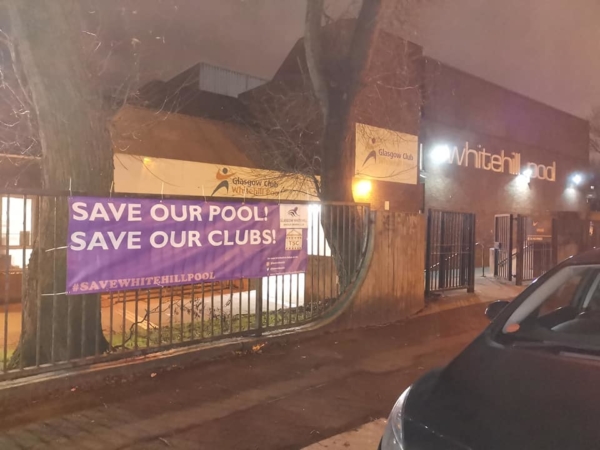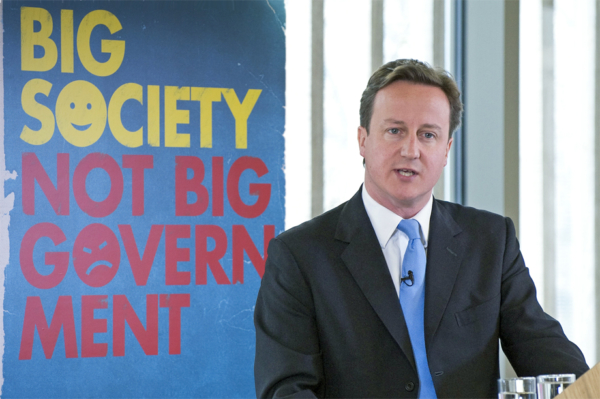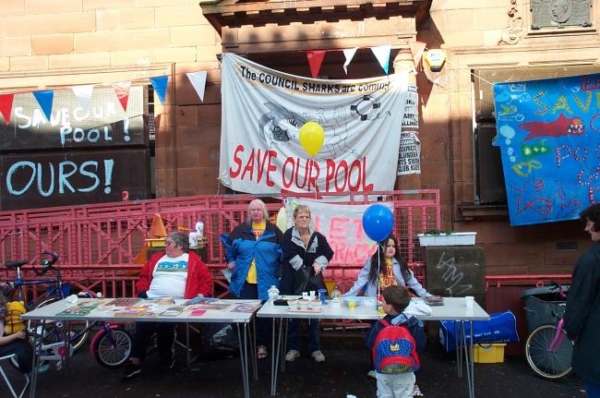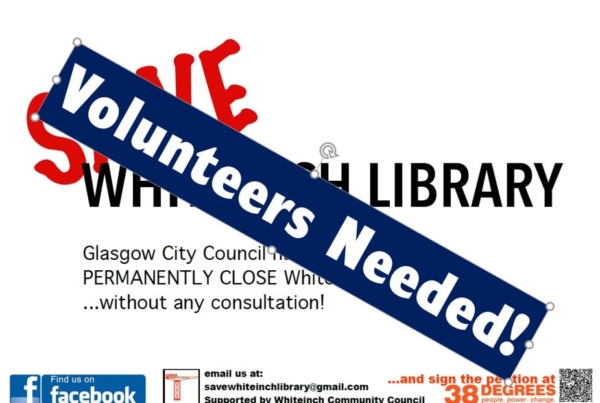Powerful Communities can put a halt to “Community Empowerment”
Back at the end of 2018 stories started to circulate about the future of Whitehill Pool in Dennistoun. Over the next few months details of properties owned and managed by Glasgow Life that were being “reviewed” emerged, and the local people and users of the pool began a highly successful community campaign in support of the pool and other local sports facilities. In the years since, Whitehill Pool has secured investment and has been guaranteed a future. Glasgow City Council will tell you that this is a story that shows the local campaigners were wrong, that it wasn’t going to close. The reality is that the reverse is true, the council wouldn’t dare close the place after the organised campaign demonstrated that the local people wouldn’t accept it. Last year, when we emerged from the first lockdown, some libraries were re-opening, some were delaying opening because of COVID restrictions, and others were being “reviewed” with no promise of ever re-opening. A highly visible grassroots campaign began in Pollokshields to protect their local library, meeting outside the closed building to make art, banners and to read books. And here we are again, the threat of closure or asset transfer hangs over dozens of community facilities while Glasgow City Council (GCC) and Glasgow Life (GL) have this annual dance around the Council budget and the GL property portfolio.

Essentially, this dance is about a shortfall in budget. GL operate each year with a flat service fee from GCC and the revenue derived from the operation of their venues. Roughly, each year GL’s books show an income of around £120M and outgoings of much the same. This £120M is made up of two thirds from the service fee (around £80M) and one third (£40M) from their own income. The result of the pandemic is that they have had little or no revenue and are £40M short. About half of this has been covered by schemes such as furloughing staff and the fight is about whether GCC will give GL the shortfall or, indeed, whether the Scottish Government will give GCC the money to plug the gap. The difference between this and any other council Department in Glasgow, or most leisure and cultural services provided by councils elsewhere, is the existence of Glasgow Life.
Glasgow Life was set up in 2006 by Glasgow City Council. They were a private company, wholly-owned by the Council, who then became a registered charity the following year, 2007. It is what is known as an ‘Arm’s Length External Organisation’ (ALEO). Like housing stock transfer from council-owned to independent housing associations, it was very much in vogue at the time and part of what New Labour called “modernisation”. But this is not the argument that many would like us to be having, they would prefere a narrative where one party is the baddie and the other blameless. It is not about whether Labour or SNP are to blame, that is not the debate here. It is still the tactic today, continued on, whoever has been in charge at Holyrood, Westminster or George Square. It is what David Cameron called “The Big Society” and what the Scottish Government call Community Empowerment.

David Cameron launches the Big Society
The Community Empowerment Act, on the face of it, acknowledged great campaigns such as Govanhill Baths, the land buy-outs in Islands and other examples of the community taking control of unused space or taking over what had been privately owned land, turning it to community use. It purported to be a charter for increasing localised democracy. But what it started was a deliberate strategy to do this, not as a model for situations that arise where community ownership is desired and appropriate, but as the norm. The emergence of the “People Make Glasgow Communities” strategy, as a potential way of outsourcing services to the third sector, is the direct outcome of the Community Empowerment Act 2015 .
Backroom deals negotiated over a hot property portfolio are the exact opposite of Community Empowerment. In fact, the creation of these ‘arms-length’ companies, the transfer of the housing stock and other such moves dramatically disempower the population, taking away one of the few tools of power that they have, their vote. Previously the council and its councillors could be held to account every 4 years at the ballot box. Now, if the housing stock is shit, your councillor isn’t held responsible, they are ‘on your side’ and will write a letter to the Housing Association but, ultimately, they will tell you it is “out of their hands”. A main selling point of the Community Empowerment Act was the proposed “participatory budgeting” yet here we are, locked outside, our “participation” limited to placards, petitions and social media.
There are times when Community ownership is the right model for a specific project and times when a partnership between the council and a local third sector group works. But imagining that this model will work automatically, when it didn’t evolve from the local circumstances, is not backed by evidence. Places like The Hidden Gardens in Pollokshields or Malls Mire woodland in Toryglen are good examples of the latter, Govanhill Baths being the perfect reminder of the former. Their community-owned and run Wellbeing Centre comes after 20 years of fighting and was the last resort for the campaign. The first 5 years was campaigning to stop the pool closing or pushing for the Council to re-open the place, only forming a Trust to bid for the building when GCC put the land and building up for sale to potential developers.

Govanhill Baths Save Our Pool Campaign 2001
But trying to artificially create a demand for community control where none exists, to shoehorn a disparate group into a company to run these services and assets is a recipe for disaster. It is, in effect, creating dozens of little unaccountable Glasgow Life’s, all costing more than it costs for the council to run them. The deficit in costs is ultimately met by reducing services, cutting opening hours and replacing paid workers with volunteers. Instead of 30 libraries HR, payroll and admin done in one place there are 30 little offices all tied up with the day to day paperwork and the constant, intense, fund-raising, always one year from potential closure. Thirty little Glasgow Life’s all negotiating against the threat of closure year-on-year. The responsibility placed on individuals to maintain such a project where there was no visible community support to start with can be crippling.
The safest, most secure and most democratically accountable model for ownership and management of these facilities is for it to be done in-house by the GCC.
The excuse for “a review” is often that these facilities are under-used, that they don’t have the numbers to make it viable. The facilities with less demand, less usage, need MORE help and need to be overseen and underwritten by the Council. They don’t take this attitude with minority languages, they don’t do it to Opera. In those cases they would agree with me, that the lack of use is evidence that it needs more subsidy in order that the minority get a full service.
Of course, there is an election on, which is why it is likely that a solution will be found in the short-term. But that election also means that false opposition and partisan positions of support will pollute the debate. We should not let that distract us. Doing this during an election period IS a great example of community empowerment, the vocal outcry will stop any closures – because they don’t want to lose votes. But make no mistake, it doesn’t end here, we need to be wary of losing assets over the coming years. GL have 14 facilities where they want to transfer ownership to a community organisation that doesn’t currently exist, where no local groups have expressed a desire to do this. And, as we saw last year in Pollokshields or 2 years ago in Dennistoun, that list will always be there, our vital resources, at the heart of our communities, being used as a bargaining chip. Let’s do as the people in Kinning Park did 25 years ago, Govanhill did 20 years ago, as Dennistoun did 2 years ago, as Pollokshields, Whiteinch and Maryhill are doing right now. Say no. Tell them we will not accept this.

What can we do? Visit the Facebook and other online pages of groups who are fighting the closures. Glasgow Against Closures has information on all of the facilities that could be under threat now or in the future. They have an online petition online petition against all closures in the city. Search for and join the local group in your area. If there isn’t a local group, start one. Contact organisations like Living Rent Glasgow Trades Unions such as GMB, UNITE or UNISON. They will have activists in your area who will be organising or who will put you in touch with those who are. We will likely win this round. But what we do now prepares us for this in the future, strengthens our hand, and making our voices heard, forcing the councils to listen and respond, is far more empowering to communities than forming yet another community trust. As we say in Govanhill, united we will swim!

A great summary of the smoke and mirrors that forms much of “modern” local government.
Maybe it is time for us to take direct action to say “No!” to this theft of our public assets. If councils have successfully out-sourced their responsibilities and elected members have, by their own admission, no power over how our assets are managed, it begs the questions; Why are we paying council tax ? Why are we voting for councillors?
How about a show of “community empowerment” by a mass cancellation of our council tax Direct Debits? One month’s worth should send an initial message. (We can put the cash aside and repay it at our leisure, this is just a show of strength). I’d suggest Glasgow Fair Fortnight in July as an apt date.
And a mass boycott of the next council elections. Since councillors are “powerless” why should we vote them a job and a wage?
Maybe we should be sending our council tax and votes to the various arms-length “hingers-on” sub contractors that “deliver excellence” for us and bypass the council all together? Surely that’s the ultimate goal of our council leaders anyway?
Glasgow Council’s actions remind me of the old joke amongst fed-up retail workers; “This job would be easy if it wisnae for the bloody customers!”
They have off-loaded Housing, Libraries, Sports Centres, Community Centres, Care and Repair, Town Halls, Swimming Baths, Parks Maintenance, Road Repairs…….what are they for any more? Why do we need them?
Who, in reality, empowers who? It is us, the public, who empowers the council.
This is all very well, Wul, but it’s a bit light on the ‘how’. How are such mass strikes to be organised? By whom? Or do you expect tham to happen spontaneously, ‘magically’, all by themselves?
The creation of non-profit-making ALEOs had nothing to do with community empowerment. They’re devices that government uses to depress its overheads and therefore public taxation. They work by transferring more of the cost involved in delivering services from the public purse to the wallets of the private service user. In this respect, it’s a form of privatisation.
Our elected representatives retain oversight of the contracts that ALEOs have with government to deliver services on our behalf. Community empowerment happens when communities enable themselves to participate more effectively in this oversight and in the work of government more generally. It happens not by magic, but only through the hard work of community capacity building, the reformation of our democratic structures to make them less representative and more participative of communities, and the gradual devolution of the powers and responsibilies of government to enable ever more local community decision-making.
Hear! Hear!
The idea that community trusts that emerge from the “bottom up”, which involve local people with a huge stake in owning and managing a service or a place is the same as ownership and management by an ALEO such as Glasgow Life is a false equivalency that unfortunately fundamentally undermines your argument.
Glasgow Life and other ALEOs are (it could reasonably be argued) “fake” third sector organisations. They have “spun out” of the public sector, often as a means of reducing the headcount of council staff and, as you allude to here, often to take advantage of tax exemptions due to charitable status. Their boards are usually filled with councillors in order to maintain Council control.
Small third sector organisations, on the other hand, regularly organise on the premise of one member, one vote, and are directly democratically accountable to their members. The members are drawn from those who utilise the facilities or who have a significant stake. They can (and often do) remove the people in charge. The Community Empowerment (Scotland) Act demands this of any body keen on exercising their rights under Section 3 or 5 of the Act.
The idea of ordinary people having the ability to remove Bridget McConnell (wife of the former First Minister Baron Jack McConnell) or their board members from running Glasgow Life is (ahem) slightly far fetched.
Now don’t get me wrong: local authorities should definitely get more funding for maintaining services. Where the money comes from is of course a matter for politicians to decide, and we all know the pressures that Scottish local authorities have been under due to a decade of austerity.
In my career, I have seen what seems to be a distrust of the whole concept of the third sector before. It seems to be a hangover from an Old Labour/Marxist perspective, where the third sector does not essentially compute (since it is neither the public sector nor the private sector).
I have written that Marxism would likely have been very different if Marx had lost the leadership of the Communist Party at the first international in Paris to Mikhail Bakunin. Bakunin was an anarchist who believed in community control and ownership of the means of production at a very local level, rather than state centrism, particularly through co-operatives and one member one vote. Marx was actually documented as being supportive of co-operatives up until this time, but he had to put distance between his own version of the path to communism and Bakunin’s.
The third sector makes perfect sense under certain versions of socialism. Empowered communities are healthy communities. And while false equivalency won’t help the cause, people power – I fully accept – just might. I wish you every success.
Yep, common ownership of the means of production was for fellow Hegelians, Bakunin and Marx, a material precondition of democratic decision-making, though they differed over how that condition was to be realised. Marx reckoned it could only be realised transitionally through the catastrophic collapse of free-market capitalism into state capitalism commanded by a ‘vanguard’ dictatorship of the proletariat, while Bakunin reckoned it could be realised immediately through the development of what we might now term a ‘third sector’ economy of cooperative, non-profit-making, social enterprises and voluntary networks thereof.
Bakunin opposed Marx because he thought that any vanguard dictatorship would inevitably lose its transitional nature and become the self-perpetuating fundament of a new and deeper alienation of the producer from his or her product. Such a dictatorship would simply spawn a new class of apparatchiki, who would run the state ostensibly in the name of the proletariat but, in reality, only as a machine in the interests of the machine itself. (https://www.marxists.org/reference/archive/bakunin/works/1872/karl-marx.htm)
I tend to agree with the drift of your argument that community empowerment can and does provide good examples and that we need to seek ways of facilitating it.
The main article, I think, was presenting a false dichotomy – as you point out – and I got a strong sense of Stalinist dirigisme lying behind it.
I was a trade unionist all my working life and I think working people should be members of trade unions, but I also know that trade unions can be dysfunctional and the three unions mentioned by Mr Monaghan – GMB, Unison and Unite – are the very unions which colluded with a clique of Labour Councillors to deny thousands of women employees of Glasgow City Council equal pay. We need member empowerment in trade unions, too.
I am wary about the thrust of this article, because I think that it is seeking to blackguard ‘community empowerment’, by means of the ‘straw man fallacy’, to stop the public interfering in cosy deals between some Councillors and senior trade unionists
Union democracy provides a good example of community empowerment and how we can defend it.
In 1911, the German sociologist and member of the Marxist SPD, Robert Michels, put forward the view that all democratic organisations were prone to become oligarchies because of the growth and size of modern organisations, the need for specialisation of officials, and the necessity that this division of labour would lead the rank and file to struggle to understand and control the activities of their leaders. Michels argued that this amounted to a quasi-natural law: all groups, regardless of how democratic they may be at the start, eventually and inevitably develop into oligarchies with swollen bureaucracies.
The so-called ‘organising model’ of union democracy, which facilitates activism rather than passivism on the part of union members, was inspired by Michels and stemmed from the desire to revitalise labour unions in the US and to prevent them from ever again falling into the hands of corrupt oligarchs and racketeers. However, its principles can be applied to any union.
https://uniondemocracy.org
A wee word of warning. Michels later emigrated to Italy and joined the revolutionary syndicalist wing of the Italian Socialist Party, which became Mussolini’s Fascist Revolutionary movement in 1914.
I specifically mention those three trades unions in a particular context of organising against closures and transfers. The reason it is those three unions is that is where you will find the workers whose jobs are at risk of being lost or being transferred to a different employer without consulting them. I dont necessarily disagree with other things you say about trade unions or those particular unions, but I wouldnt use that as a reason to exclude the workers in these services from having a say or campaigning to keep their jobs. Having spoken to the unions I have found that in no case of transfer of ownership and control to community groups in Glasgow has there been union or worker involvement in any of the negotiations with the proposed new owners.
Much the same thing happened earlier under college opt-outs from local authorities, which was supposed to let a hundred flowers bloom or something, but they ended up recreating their own expensive human resources, public relations and marketing departments, got infected with managerialism, paying huge salaries to their chiefs and acolytes, enabling a corrupt and bullying culture in some cases, and inviting infiltration by those ideologically opposed to the earlier social democratic model. Unhealthy competition between colleges arose where creating commons would have made more sense. Marketeers and profitarian ideologies can end up creating more conformity than even flawed local democratic government oversight.
Yes, good point the colleges are another good example. Now completely unaccountable and funding and control of funding moved from local to central Govt.
Colleges moved from local government control in 1993! Different times. Completely different policy agenda. I suppose you could argue that it was a fairly early example of the commodification and marketisation of public services / a public good (in this case education) but really it’s stretching the point a fair bit, is it not? Colleges are large and complex organisations. About as far away as small community led and owned organisations as you can get.